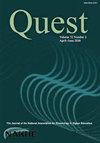成为一个学习者意味着什么,以及在动作技能学习中学习和了解意味着什么
IF 1.7
3区 教育学
Q2 EDUCATION & EDUCATIONAL RESEARCH
引用次数: 0
摘要
本文的目的是提出关于运动能力和运动技能学习的观点,这些观点考虑了作为学习者和认知者的运动的内在的、有意义的价值。本文将介绍和讨论关于运动能力和运动技能学习的两种观点:现象学和现象学,重点是现象学。由于这两种观点之间的一些相似之处引起了质疑和混淆,本文试图主要通过实证例子来澄清一些显著的异同。一个总的区别是现象学关注的是“作为学习者意味着什么”这个问题?而现象学导向研究的一个核心问题是:“对于学习者来说,学习和知道期望被知道的东西意味着什么?”这两种方法都认同学习者的观点。本文章由计算机程序翻译,如有差异,请以英文原文为准。
What it Means to be a Learner and What it Means to Learn and Know in Movement Skill Learning
ABSTRACT The aim of this paper is to suggest perspectives on movement capability and movement skill learning that take into account the intrinsic, meaningful value of moving in terms of the experience of the mover as a learner and a knower. Two perspectives on movement capability and movement skill learning will be presented and discussed here: phenomenology and phenomenography, with a focus on phenomenography. Since some similarities between these two perspectives has raised questions and caused some confusion, this paper attempts to clarify, mainly through empirical examples, some significant similarities and differences. An overall difference is that phenomenology is concerned with the question “what does it mean to be a learner”?, while a central question for phenomenographic oriented research is instead: “what does it mean for learners to learn and know what is expected to be known?” Both approaches share an interest in acknowledging the perspective of the learner.
求助全文
通过发布文献求助,成功后即可免费获取论文全文。
去求助
来源期刊

Quest
社会科学-运动科学
CiteScore
4.50
自引率
14.30%
发文量
16
期刊介绍:
Quest is the official journal of the National Association for Kinesiology in Higher Education (NAKHE). It is the leading journal for interdisciplinary scholarship for professionals in kinesiology in higher education. Quest provides a public forum for scholarship, creative thought, and research relevant to a broad range of interests held by faculty and leaders in higher education today.
Quest publishes: 1) manuscripts that address issues and concerns relevant and meaningful to the field of kinesiology; 2) original research reports that address empirical questions that are contextualized within higher education and hold significance to a broad range of faculty and administrators in kinesiology; and 3) reviews of literature and/or research of interest to one or more sub-disciplines in kinesiology. Quest does not publish papers focused on sport (e.g., amateur, collegiate, professional) that are contextualized outside of kinesiology in higher education.
 求助内容:
求助内容: 应助结果提醒方式:
应助结果提醒方式:


